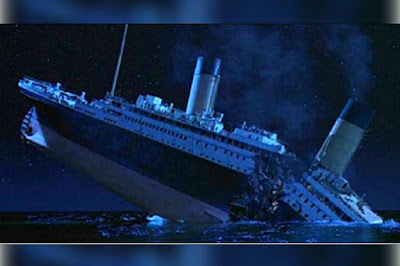 |
| Screen shot from the movie Titanic |
We
all know the story of the end of the Titanic, how the band played on as the
giant ship slipped under the cold waves of the Atlantic Ocean.
A similar scene is happening now as the
Pacifica Foundation dithers while a storm of debts prepares to destroy the once
vital public broadcaster.
In
a somber Wednesday (1/3) memo to Pacifica’s employees, Pacifica’s interim
Executive Director Bill Crosier says the Board of Directors is hopelessly
paralyzed about how to proceed.
The last remaining way out – voluntarily filing
for Chapter 11 bankruptcy to protect Pacifica’s assets – is being ignored by
the Board.
 |
| The Empire State Building with a bad moon rising |
As
of next Monday (1/8), the Empire State Realty Trust (ESRT), winner of a two
million dollar judgment against Pacifica can file a lien on the organization’s
assets in California, New York, Texas and Washington, DC. This means that all
of Pacifica’s bank accounts and property may be seized at any moment.
When/if
this happens, Pacifica will loose the ability to operate and may be forced into
Chapter 7 bankruptcy liquidation. This will sink not only Pacifica’s WBAI
in New York, it could also mean the end of KPFA in the Bay Area as well as
stations in Los Angeles, Houston and Washington, DC.
The
potential end of KPFA caught the attention of the national news media. On
Tuesday (1/2) the Wall Street Journal
published an excellent piece on the situation [link].
RICHARD STANLEY, LEADER
OF THE STANLEY FOUNDATION, DIES AT AGE 84
Since
I left Public Radio International (PRI) in September 1997 to open my own
consulting business, I’ve been pleased to have many excellent clients. Perhaps
my favorite client in the past twenty years is The Stanley Foundation based in
Muscatine, Iowa.
 |
| Dick Stanley |
Yesterday
I heard about the death of the leader of the foundation during the twelve years
I worked with the organization: Richard H. (“Dick”) Stanley. He passed away in
November 2017.
Dick
Stanley embodied the Stanley Foundation’s visions of global citizenship, secure
peace and an informed participation in governance. Dick was also a believer in
public radio’s fact-based journalism.
Under
Dick Stanley’s leadership, the foundation created remarkable independent
programs for public radio dealing with topics such as the legacy of the war in
Vietnam, Russia after the fall of communism and the new power of emerging
countries such as India and Brazil.
Stanley
Foundation programs were hosted and reported by Walter Cronkite, Charlayne
Hunter-Gault, David Brancaccio, David Brown and Simon Marks. Programs were
designed and directed by Kristin McHugh and Keith Porter, now the President and
CEO of the foundation.
Dick
Stanley was a quiet person who let others have the headlines. There was not a
cynical bone in his body. Perhaps that was a reason that world leaders,
diplomats and business people so often sought his behind-the-scenes advice. I
am thankful that I knew and worked with Dick Stanley.
By
the way, the Stanley Foundation is still active in public media. They host the
International Reporting Project (IJR) which sends journalists to place around
the world. You can learn more about IJR here.
NPR NEWS/TALK STATIONS
SEE A DECLINE IN WEEKLY LISTENERS, PREPARE FOR 2018 MID-TERM ELECTIONS
As
you know, NPR News/Talk stations have had a remarkable two years increasing
audience, revenue and impact through the 2016 election cycle. Now the number of
weekly listeners is falling at some stations. The focus now is preparation for the 2018
mid-term elections.
Much
was accomplished during the time of growth.
Perhaps the most important (and hopeful) development for journalism is
the growing respect for fact-based reporting. Folks in the news/talk business
are paying attention.
In
the December Nielsen Audio ratings, the number of weekly listeners to NPR
News/Talk stations declined in all four markets we are featuring today compared
to the prior month.
In the nation’s capital, WAMU had its third straight month of declining estimated weekly listeners. WAMU now trails commercial radio WTOP in both average-quarter hour share and weekly cume.
NPR News/Talk KERA also has lost estimated weekly listeners for three consecutive monthly Nielsen Audio sweeps.
In Houston, KUHF also had a dramatic downturn.







No comments:
Post a Comment